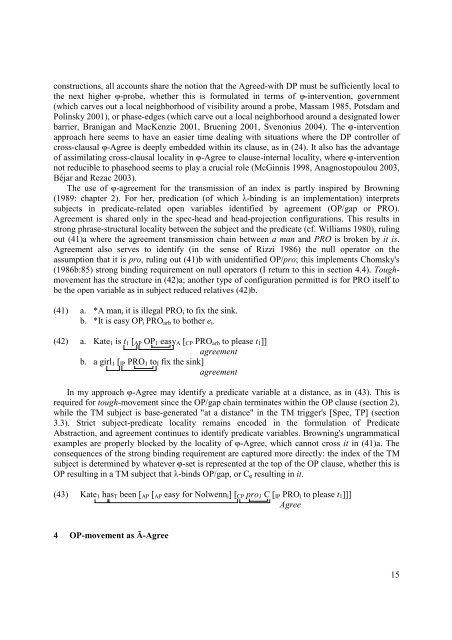1 On tough-movement* Milan Rezac, University ... - Multimania.co.uk
1 On tough-movement* Milan Rezac, University ... - Multimania.co.uk
1 On tough-movement* Milan Rezac, University ... - Multimania.co.uk
You also want an ePaper? Increase the reach of your titles
YUMPU automatically turns print PDFs into web optimized ePapers that Google loves.
<strong>co</strong>nstructions, all ac<strong>co</strong>unts share the notion that the Agreed-with DP must be sufficiently local to<br />
the next higher φ-probe, whether this is formulated in terms of φ-intervention, government<br />
(which carves out a local neighborhood of visibility around a probe, Massam 1985, Potsdam and<br />
Polinsky 2001), or phase-edges (which carve out a local neighborhood around a designated lower<br />
barrier, Branigan and MacKenzie 2001, Bruening 2001, Svenonius 2004). The φ-intervention<br />
approach here seems to have an easier time dealing with situations where the DP <strong>co</strong>ntroller of<br />
cross-clausal φ-Agree is deeply embedded within its clause, as in (24). It also has the advantage<br />
of assimilating cross-clausal locality in φ-Agree to clause-internal locality, where φ-intervention<br />
not reducible to phasehood seems to play a crucial role (McGinnis 1998, Anagnostopoulou 2003,<br />
Béjar and <strong>Rezac</strong> 2003).<br />
The use of φ-agreement for the transmission of an index is partly inspired by Browning<br />
(1989: chapter 2). For her, predication (of which λ-binding is an implementation) interprets<br />
subjects in predicate-related open variables identified by agreement (OP/gap or PRO).<br />
Agreement is shared only in the spec-head and head-projection <strong>co</strong>nfigurations. This results in<br />
strong phrase-structural locality between the subject and the predicate (cf. Williams 1980), ruling<br />
out (41)a where the agreement transmission chain between a man and PRO is broken by it is.<br />
Agreement also serves to identify (in the sense of Rizzi 1986) the null operator on the<br />
assumption that it is pro, ruling out (41)b with unidentified OP/pro; this implements Chomsky's<br />
(1986b:85) strong binding requirement on null operators (I return to this in section 4.4). Toughmovement<br />
has the structure in (42)a; another type of <strong>co</strong>nfiguration permitted is for PRO itself to<br />
be the open variable as in subject reduced relatives (42)b.<br />
(41) a. *A man i it is illegal PRO i to fix the sink.<br />
b. *It is easy OP i PRO arb to bother e i .<br />
(42) a. Kate 1 is t 1 [ AP OP 1 easy A [ CP PRO arb to please t 1 ]]<br />
agreement<br />
b. a girl 1 [ IP PRO 1 to I fix the sink]<br />
agreement<br />
In my approach φ-Agree may identify a predicate variable at a distance, as in (43). This is<br />
required for <strong>tough</strong>-movement since the OP/gap chain terminates within the OP clause (section 2),<br />
while the TM subject is base-generated "at a distance" in the TM trigger's [Spec, TP] (section<br />
3.3). Strict subject-predicate locality remains en<strong>co</strong>ded in the formulation of Predicate<br />
Abstraction, and agreement <strong>co</strong>ntinues to identify predicate variables. Browning's ungrammatical<br />
examples are properly blocked by the locality of φ-Agree, which cannot cross it in (41)a. The<br />
<strong>co</strong>nsequences of the strong binding requirement are captured more directly: the index of the TM<br />
subject is determined by whatever φ-set is represented at the top of the OP clause, whether this is<br />
OP resulting in a TM subject that λ-binds OP/gap, or C φ resulting in it.<br />
(43) Kate 1 has T been [ AP [ AP easy for Nolwenn i ] [ CP pro 1 C [ IP PRO i to please t 1 ]]]<br />
Agree<br />
4 OP-movement as Ā-Agree<br />
15
















